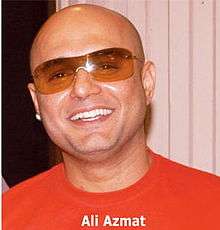Ali Azmat
| Ali Azmat | |
|---|---|
 | |
| Native name | علی عظمت |
| Born |
20 April 1970 Havelian, Khyber Pakhtunkhwa, Pakistan |
| Nationality | Pakistani |
| Occupation |
|
| Musical career | |
| Origin | Lahore, Punjab, Pakistan |
| Genres | |
| Occupation(s) |
|
| Instruments |
|
| Years active | 1986-present |
| Labels |
|
| Associated acts |
Jupiters Junoon |
Ali Azmat (born 20 April 1970) is a Pakistani singer-songwriter, musician and actor. He is best known as the lead singer for the influential Sufi Rock band Junoon and for his subsequent solo career. In 2001, he became part of the first Pakistani band (Junoon) ever to perform at the United Nations General Assembly.
Early life
Azmat was born in Havelian, Khyber Pakhtunkhwa, while he grew up in Garhi Shahu, Lahore, into a family of Kashmiri descent.[1] His father, Nazir Ahmed Butt, was a middle-class businessman, who passed away in 2013.[2] He went to Sydney, Australia, for his higher studies, but soon returned to Pakistan before completing university. His first band Jupiters was known for performing covers at small gigs in Lahore. While with them, Azmat wrote his legendary hit song Dosti. He later sang and recorded Dosti with Junoon, after which the song gained national fame.[3]
Career
Jupiters
Azmat started out his career with Jupiters in 1986, based in his hometown of Lahore. Jupiters were known for doing covers of American pop and rock songs at small gigs. Azmat left Jupiters in 1990 to join Junoon.
Junoon
Azmat released his first album Junoon with the band, the album was produced by band's founder and lead-guitarist Salman Ahmed. Azmat's vocals featured on all the songs except for Khwaab, Jiyain and Jogiya. After launch of the band's second album Talaash both Azmat and Junoon rose to fame.
Azmat alongside Junoon in 1995 launched Kashmakash, a compilation album and first ever in Pakistan, one song from this compilation Ehtesaab caused a major controversy. The 1996 album Inquilaab was a major hit and its only single Jazba-e-Junoon was a super hit and topped chart, it became signature song and national song of 1996 Cricket World Cup and Pakistan national cricket team. Azmat gained further success after release of the sufi rock hit single Sayonee from their fourth album Azadi (1997). Azmat got international fame after release of Azadi in India. Azmat featured on three more albums Parvaaz (1999), Andaz (2001) and Dewaar (2003) with the band. After release of Dewaar, the band broke-up, Azmat continued his solo career.
Solo career
After breaking up of Junoon, Azmat released his first solo album Social Circus (2005), whose single Na Re Na received positive reviews and became a major hit in country. Azmat released further four albums Klashinkof (AK-47 in Urdu) in (2008), Josh-e-Junoon (2010) whose title track Josh-e-Junoon became anthem for Pakistan in 2011 Cricket World Cup, Bum Phatta (2011) and Chalta Main Jaun (2011).
Bollywood
Azmat stepped into Bollywood in 2003, when his single "Garaj Baras" from Junoon's 2--3 album Azadi was used for the movie Paap. In 2012, Azmat recorded two songs Yeh Jism Hai Toh Kya and Maula for Bollywood erotic thriller Jism 2.[4]
Discography
| Year | Album(s) | Song(s) |
|---|---|---|
| 2003 | Paap | Garaj Baras |
| 2005 | Social Circus | |
| 2008 | Klashinfolk | |
| 2008 | Coke Studio Season 1 | Garaj Baras, Mein Challa |
| 2010 | Josh-E-Junoon | |
| 2011 | Bum Phatta | |
| 2011 | Chalta Mein Jaaon | |
| 2012 | Jism 2 | Maula, Yeh Jism Hai Toh Kya |
| 2012 | Josh | |
| 2013 | Waar | |
| 2013 | Coke Studio Season 6 | Babu Bhai |
| 2015 | Coke Studio Season 7 | Rangeela |
| 2016 | Coke Studio Season 9 | Man Kunto Maula |
| 2018 | Coke Studio Season 11 |
Filmography
Awards and nominations
Junoon won the "Best International Group" award at the Channel V Awards in New Delhi in 1998, beating Prodigy, Sting and Def Leppard. The Band's first international release Azadi, went triple platinum in India alone. "Sayonee" was at the top of the Mtv India and Channel V charts for over two months. Junoon won the Award for "Best Rock Band" at the Indus Music awards in 2004. Indus Music Awards and from ARY Asian/Bollywood Awards. Junoon has also been awarded several awards for their contribution towards peace and South East culture by BBC, UNESCO and South Asian Journalists Association. Junoon was nominated for Best Musical Group at the Lux Style Awards several years in a row.
- First Indus Style Awards (2006)
- Won - Best Sound of Style Award.[5] – 3rd Jazz IM Award (2006)
- Won - Best Pop Male Artist.[5]
- The Nestle Fruita Vitals Pakistan Style Awards (2010)
- Won - Stylish Singer Male.[6]
References
- ↑ Interview with Samina Peerzada. "Ali Azmat on Rewind with Samina Peerzada | Junoon | Relationships | Episode 8", uploaded on YouTube on the 8 February 2018.
- ↑ Rafay Mahmood (2 March 2013), "For Ali Azmat, the show goes on despite father’s death", The Express Tribune. 22 June 2018.
- ↑ For Ali Azmat, the show goes on despite father’s death
- ↑ Banned in Pakistan, Junoon's Ali Azmat scores big with his Jism 2 songs
- 1 2 "Ali Azmat Awards". Archived from the original on 7 July 2011. Retrieved 5 November 2010.
- ↑ "When the stars start to shine". Saadia Qamar. Express Tribune. Archived from the original on 26 October 2010. Retrieved 5 November 2010.